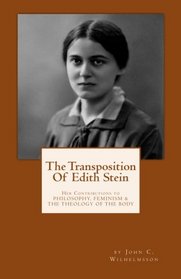Barbara S. reviewed The Transposition Of Edith Stein: Her Contributions to Philosophy, Feminism and The Theology of the Body on
The Transposition of Edith Stein
Review by Barbara Bamberger Scott
This is a book of philosophy based on the intellectual works of an extraordinary woman. Edith Stein, a German woman born Jewish, became a student of philosophy who worked with some of the great intellectual innovators of her time, and converted to Christianity in the early twentieth century.
The author, John Wilhemsson, is a professor of philosophy at San Jose State University who has made an in-depth study of this remarkable womans contributions to the body of philosophy. In this small book he seeks to establish that Stein did not merely copy or assist the great male philosophers of her day but in fact had unique and valuable ideas that deserve to be credited.
The book is biographical only in a limited sense: the author must give the reader a brief picture of Stein a child prodigy with unusual empathy and caring for others whose philosophical bent developed when she went to university and studied with the great Edmund Husserl and others. Wilhemsson handles this back-story deftly, although those expecting more of the biographical side will be disappointed (Stein became a nun, was killed by the Nazis, was canonized by Pope John Paul II and is revered throughout the Catholic world as Saint Teresia Benedicta of the Cross). The author rigorously develops his single point: that Stein was a philosopher in her own right whose ideas of phenomenology and particularly of feminism are worthy of recognition, and indeed dovetail aptly with the thinking of Pope John Paul II.
The book is elegantly simple in its production, well formatted, with a warm, well chosen photo of Edith Stein on the cover. It is copiously footnoted as one would expect from a scholar of Wilhemssons academic credentials. The subject matter is drawn from the author's Masters thesis. It is written primarily for those who share his academic interests: philosophers, clergy and thoughtful Catholics; and will be useful for them in expanding their impressions of Steins stature as a philosopher. The word transposition as used here does not refer to Steins sanctity but rather to her gift not only of empathy but of the intellectual capacity to understand and define empathy and apply it to ones perceptions of the world. My one wish for the book would have been for Wilhemsson to have drawn a line between this empathy and Steins love for her fellow human beings which ultimately led her to sacrifice her life.
Review by Barbara Bamberger Scott
This is a book of philosophy based on the intellectual works of an extraordinary woman. Edith Stein, a German woman born Jewish, became a student of philosophy who worked with some of the great intellectual innovators of her time, and converted to Christianity in the early twentieth century.
The author, John Wilhemsson, is a professor of philosophy at San Jose State University who has made an in-depth study of this remarkable womans contributions to the body of philosophy. In this small book he seeks to establish that Stein did not merely copy or assist the great male philosophers of her day but in fact had unique and valuable ideas that deserve to be credited.
The book is biographical only in a limited sense: the author must give the reader a brief picture of Stein a child prodigy with unusual empathy and caring for others whose philosophical bent developed when she went to university and studied with the great Edmund Husserl and others. Wilhemsson handles this back-story deftly, although those expecting more of the biographical side will be disappointed (Stein became a nun, was killed by the Nazis, was canonized by Pope John Paul II and is revered throughout the Catholic world as Saint Teresia Benedicta of the Cross). The author rigorously develops his single point: that Stein was a philosopher in her own right whose ideas of phenomenology and particularly of feminism are worthy of recognition, and indeed dovetail aptly with the thinking of Pope John Paul II.
The book is elegantly simple in its production, well formatted, with a warm, well chosen photo of Edith Stein on the cover. It is copiously footnoted as one would expect from a scholar of Wilhemssons academic credentials. The subject matter is drawn from the author's Masters thesis. It is written primarily for those who share his academic interests: philosophers, clergy and thoughtful Catholics; and will be useful for them in expanding their impressions of Steins stature as a philosopher. The word transposition as used here does not refer to Steins sanctity but rather to her gift not only of empathy but of the intellectual capacity to understand and define empathy and apply it to ones perceptions of the world. My one wish for the book would have been for Wilhemsson to have drawn a line between this empathy and Steins love for her fellow human beings which ultimately led her to sacrifice her life.




